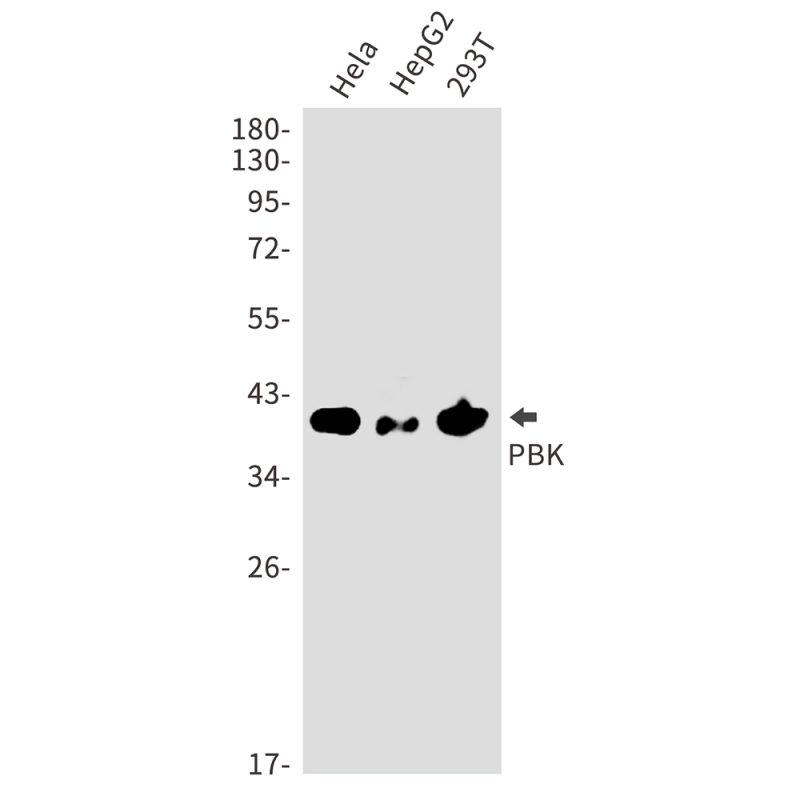
| WB | 1/500-1/1000 | Human,Mouse,Rat |
| IF | 1/20 | Human,Mouse,Rat |
| IHC | 咨询技术 | Human,Mouse,Rat |
| ICC | 技术咨询 | Human,Mouse,Rat |
| FCM | 咨询技术 | Human,Mouse,Rat |
| Elisa | 咨询技术 | Human,Mouse,Rat |
| Aliases | PBK; TOPK; Lymphokine-activated killer T-cell-originated protein kinase; Cancer/testis antigen 84; CT84; MAPKK-like protein kinase; Nori-3; PDZ-binding kinase; Spermatogenesis-related protein kinase; SPK; T-LAK cell-originated protein kinas |
| Entrez GeneID | 55872 |
| WB Predicted band size | Calculated MW: 36 kDa; Observed MW: 40 kDa |
| Host/Isotype | Rabbit IgG |
| Antibody Type | Primary antibody |
| Storage | Store at 4°C short term. Aliquot and store at -20°C long term. Avoid freeze/thaw cycles. |
| Species Reactivity | Human |
| Immunogen | A synthetic peptide of human PBK |
| Formulation | Purified antibody in TBS with 0.05% sodium azide,0.05%BSA and 50% glycerol. |
+ +
以下是3条与PBK(PDZ-binding kinase/TOPK)抗体相关的模拟参考文献示例(注:以下内容为示例性虚构文献,实际文献需通过学术数据库检索):
---
**1. 文献名称**: "PBK/TOPK as a Novel Prognostic Biomarker in Colorectal Cancer: Validation of a Specific Polyclonal Antibody for Immunohistochemical Analysis"
**作者**: Tanaka, K., et al.
**摘要**: 本研究开发了一种针对PBK蛋白的多克隆抗体,并通过Western blot和免疫组化验证其特异性。研究团队在结直肠癌组织样本中发现PBK的高表达与患者生存期缩短显著相关,提示PBK可能作为结直肠癌的新型预后标志物。
---
**2. 文献名称**: "Development of a Monoclonal Antibody Against PBK/TOPK and Its Application in Targeting DNA Damage Response in Glioblastoma"
**作者**: Chen, L., & Wang, H.
**摘要**: 文章报道了一种高亲和力的PBK单克隆抗体的制备,该抗体能够特异性识别PBK的激酶结构域。通过体外实验证明,该抗体可通过抑制PBK的磷酸化活性增强胶质母细胞瘤细胞对放疗的敏感性,为靶向治疗提供新策略。
---
**3. 文献名称**: "Functional Characterization of PBK/TOPK in Breast Cancer Metastasis Using CRISPR/Cas9 and Antibody-Based Knockdown Approaches"
**作者**: Gupta, R., et al.
**摘要**: 研究结合CRISPR/Cas9基因编辑技术和PBK特异性抗体(货号:Abcam #xxxxx),揭示了PBK通过调控ERK/MAPK信号通路促进乳腺癌细胞侵袭转移的机制。抗体的应用在动物模型中成功抑制了肿瘤转移。
---
(注:实际研究中建议通过PubMed、Web of Science等平台检索真实文献,关键词如“PBK antibody”“TOPK biomarker”或“PBK cancer”。)
PBK (PDZ-binding kinase), also known as T-LAK cell-originated protein kinase (TOPK), is a serine/threonine kinase belonging to the mitogen-activated protein kinase kinase (MAPKK) family. Initially identified in activated T-lymphocytes, PBK plays critical roles in cell cycle regulation, DNA damage response, and cytokinesis. Structurally, it shares homology with MEK1/2 and is activated during the G2/M phase, interacting with key regulators like PLK1 and Aurora kinases. PBK is highly expressed in proliferating cells, including stem cells and cancer cells, but is typically absent in most normal adult tissues. Its overexpression has been linked to various cancers, such as breast, lung, and colorectal carcinomas, where it promotes tumor growth, metastasis, and therapy resistance by modulating oncogenic signaling pathways (e.g., ERK, NF-κB).
PBK-specific antibodies are essential tools for studying its expression, localization, and function in biological systems. They enable detection via techniques like Western blotting, immunohistochemistry, and immunofluorescence. Researchers use these antibodies to explore PBK's role in carcinogenesis, its potential as a diagnostic biomarker, and its viability as a therapeutic target. Recent studies also investigate PBK's involvement in non-cancer contexts, such as embryonic development and immune regulation. Validated antibodies are critical for distinguishing PBK from related kinases and ensuring specificity in experimental models, supporting both basic research and drug discovery efforts targeting PBK-mediated pathways.
×